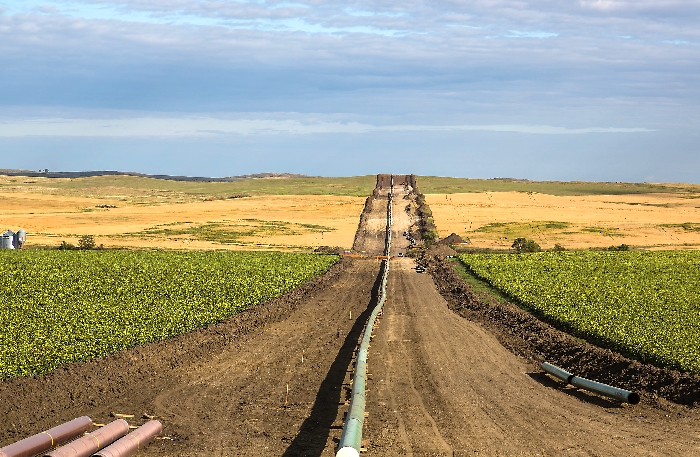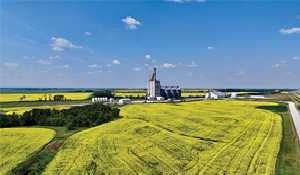The solution to Canada's pipeline problem
September 7, 2018, 11:39 am


World-Spectator editor Kevin Weedmark wrote this editorial in the September 3 issue of the World-Spectator:
Canada has a problem building pipelines.
Canada has an incredibly valuable energy resource locked in the ground in Western Canada. As a matter of fact, Canada has the third largest proven oil reserves in the world, after only Saudi Arabia and Venezuela, and ahead of Iran, Iraq, Kuwait, UAE, Russia, Libya, and the United States.
Some of the oil and gas is extracted and sold at very low prices relative to world prices because it is very difficult and expensive to get this product to world markets.
LNG export plans to get our natural gas to world markets have faltered, and now another pipeline plan has been ripped up by judges on ridiculous grounds.
The judges determined that the Liberal government didn’t understand what was meant by the Liberal government’s own requirement for a duty to consult with First Nations.
The judgement is ridiculous on many levels.
The judgement is based on the fact that a handful of First Nations in B.C. object to the pipeline based on their fears that oil coming through the pipeline will then go into tankers which will then cross the Salish Sea, where the southern resident orcas live.
This concern is itself ridiculous. Oil flowing through the pipeline will replace oil being transported by rail. Transporting it more safely will not add to tanker traffic. Oil flowing through the pipeline will meet the needs in the Lower Mainland of B.C, replacing the need for oil imports, reducing, not adding, to tanker traffic.
The vast majority of First Nations in B.C. are in favor of the pipeline and were in line to receive $400 million in benefits from the pipeline. Only four First Nations are opposed.
I can’t understand how incredibly stupid these judges must be.
Their decision means First Nations in B.C. will not receive the $400 million in benefits they would have received from Trans-Mountain.
Their decision means many business owners, contractors, and pipeline workers are now out of work.
Their decision hurts all Canadians by destroying investment in our resource industries, eliminating jobs, and reducing the income that would have come to Canada from enhanced pipeline capacity.
There has been net divestment of $8.6 billion from the energy and mining sector over the past five quarters, and that’s only going to get worse.
Pipelines are a win for Canada
Ensuring pipelines can be built means a stronger national economy, greater economic growth, more jobs, more opportunities for Canadian workers and companies, more revenue for the government to provide the services we all need.
Pipelines are a win for the environment
Pipelines are a win for the environment in three ways:
1) Every study has shown that pipelines are a much safer way to get oil from one point to another than rail.
2) For those who really think that an extra 4.49 cents a litre in carbon tax at the pump would decrease demand, giving our oil producers access to world markets will increase the value of our oil nearer the world price and have a similar effect of raising prices, but the funds would be going to oil producers, not the government.
3) Getting Canadian oil to the east coast through Energy East would decrease incoming tanker traffic by meeting Canadian needs with Canadian resources. It was sheer stupidity when TransCanada had to modify the plan to include an export terminal at Cocouna, Quebec over concerns that tankers would endanger Beluga whales—tankers are coming down the St. Lawrence every day to Quebec City laden with Saudi oil. Energy East would have reduced overall tanker traffic by eliminating the need for oil imports to eastern Canada.
Pipelines are a win for ethical oil
Every litre of oil that would flow through Energy East to Eastern Canada, every litre of oil that would flow through Northern Gateway to the northern B.C. coast, every litre of oil that would have flowed through the Trans-Mountain pipeline to Burnaby is a litre of clean, ethically sourced, environmentally regulated oil produced by well-trained, safety-conscious, well-paid Canadian oil workers.
Every litre of oil that would flow through any of these pipelines is one less litre of dirty oil that comes from countries that do not have the environmental regulations, worker protections, and human rights protections we enjoy in Canada.
There is a solution
Pipeline approvals have been a problem in Canada for awhile.
Pipeline approvals dragged out during the last government, with projects crossing B.C. and Quebec, where there is opposition, seeming to drag on forever.
Trudeau tried to take the bull by the horns, opposing Northern Gateway and making impossible demands that caused TransCanada to withdraw its application for Energy East.
He put all of his eggs in one basket with TransMountain and made a deal with Rachel Notley that he would get the pipeline built in return for her support for the federal carbon plan. That deal has now fallen apart, along with everything else around Trans-Mountain.
The government has made such a mess of the pipeline approval process that it can’t navigate the system itself.
When judges decide that the wellbeing of Killer Whales off the B.C. coast is more important than national infrastructure (despite a $1.5 billion plan to help protect the environment those whales live in) we know something has gone wrong.
Companies, and now the government, are tying themselves in knots trying to get pipelines approved, and still there are roadblocks.
In a bizarre coincidence, Kinder Morgan shareholders approved the sale of the Trans-Mountain expansion to the federal government for $4.5 billion Thursday, August 30—five minutes after the court threw out approval for the pipeline.
Those at the shareholders meeting must have been laughing their heads off.
That $4.5 billion the government spent on a pipeline without construction approval works out to $1,730 for every tax filer in Canada.
There is a solution to this ridiculous mess, however.
The federal government can change the legislation regarding pipeline approvals tomorrow.
The town and RM of Moosomin have proposed a new look at the Energy East Pipeline.
That’s a good idea, as is a look at all of the legislation surrounding pipelines.
If the judges think the government doesn’t understand its own rules, it’s time to simplify those rules.
The first order of business for the Parliament of Canada should be to put a new regulatory structure in place, so that TransMountain can proceed, and Enbridge can reapply for Northern Gateway, and TransCanada can reapply for Energy East.
With the right legislation, in 18 months we could go from this mess to a Canadian economy that is absolutely booming as pipelines are under construction across the country—from New Brunswick to the B.C. coast—where oil companies are back in the business of drilling for oil because there is a market again for Canadian oil, where Canadian steel mills are ramping up production of pipe, where large cities and small towns are booming as the investment in both oil production and the infrastructure to get the oil to market expands rapidly.
This is a very real possibility for our country.
We just need to simplify the pipeline approval process.
The world needs more clean, ethically sourced, environmentally regulated Canadian oil. Let’s put the legislation in place so that our oil producers can supply that energy, and our nation can prosper.



































